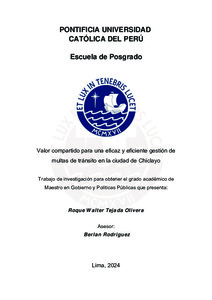| dc.contributor.advisor | Rodriguez, Berlan | |
| dc.contributor.author | Tejada Olivera, Roque Walter | |
| dc.date.accessioned | 2024-04-30T18:18:10Z | |
| dc.date.available | 2024-04-30T18:18:10Z | |
| dc.date.created | 2024 | |
| dc.date.issued | 2024-04-30 | |
| dc.identifier.uri | http://hdl.handle.net/20.500.12404/27709 | |
| dc.description.abstract | La gestión de multas de tránsito, es un proceso que se inicia con la identificación por parte del
policía, de las infracciones cometidas por conductores de vehículos, las cuales que se encuentran
tipificadas en el Reglamento Nacional de Tránsito, sanción que luego es gestionada por las
municipalidades y cuya cobranza en el caso de Chiclayo, es realizada por el Servicio de
Administración Tributaria (SATCH).
En base al análisis integral del proceso, la identificación de las funciones de los responsables de
en el flujo del procedimiento, así como de ciertos indicadores como el tiempo de registro de
papeletas en los sistemas correspondientes, la cantidad de multas impuestas y la cobranza de
las mismas durante los años 2015 al 2019, se ha podido determinar una deficiente gestión de
multas en dicho período.
A fin de identificar las causas que originan la problemática encontrada, se ha utilizado
herramientas de carácter cuantitativo y cualitativo, en el primer caso, se analizaron las bases de
datos del SATCH respecto de papeletas de infracción impuestas en los años indicados, de más
de 294 mil registros, que permitió identificar la evolución decreciente de la imposición de las
papeletas, los tiempos de demora del registro y la tasa de morosidad de la cobranza (Ver Anexo
01).
Asimismo, respecto de la fase cualitativa se realizaron entrevistas a funcionarios de todas la
entidades involucradas que permitió identificar que las causas del problema eran la débil
articulación, la deficiente coordinación y la casi nulo intercambio de información, que retrasan
el flujo de la papeleta, imposibilitan el seguimiento y control, originando su prescripción e
incobrabilidad. Dicha información además fue contrastada con bibliografía relacionada que
confirmó lo hallado en las entrevistas.
En ese sentido, a fin de dar solución al problema se plantea que a través de la formalización de
un convenio de apoyo interinstitucional, se logre una gestión coordinada, el establecimiento de
metas y la utilización de tecnología como un aplicativo de celular, para el registro, control,
seguimiento en tiempo real, y la cobranza efectiva de las multas impuestas. | es_ES |
| dc.description.abstract | The management of traffic fines is a process that begins with the identification by the police of
the infractions committed by vehicle drivers, which are typified in the National Traffic
Regulations, a sanction that is then managed by the municipalities and whose collection in the
case of Chiclayo, is carried out by the Tax Administration Service (SATCH).
Based on the comprehensive analysis of the process, the identification of the functions of those
responsible for in the flow of the procedure, as well as certain indicators such as the time of
registration of ballots in the corresponding systems, the amount of fines imposed and the
collection of the same during the years 2015 to 2019, it has been possible to determine a
deficient management of fines in said period.
In order to identify the causes that originate the problem found, quantitative and qualitative
tools have been used, in the first case, the SATCH databases were analyzed regarding the
infraction tickets imposed in the indicated years, of more than 294 thousand records, which
allowed to identify the decreasing evolution of the imposition of the ballots, the delay times of
the registration and the delinquency rate of the collection (See Annex 01).
In addition, regarding the qualitative phase, interviews were conducted with officials of all the
entities involved, which allowed identifying that the causes of the problem were the weak
articulation, the deficient coordination and the almost null exchange of information, which delay
the flow of the ballot, make it impossible to follow up, and control, causing its prescription and
uncollectibility. This information was also contrasted with related bibliography that confirmed
what was found in the interviews.
In that sense, in order to solve the problem, it is proposed that through the formalization of an
inter-institutional support agreement, a coordinated management, the establishment of goals
and the use of technology such as a cell phone application for registration, control, follow-up is
achieved in real time, and the effective collection of the fines imposed. | es_ES |
| dc.language.iso | spa | es_ES |
| dc.publisher | Pontificia Universidad Católica del Perú. | es_ES |
| dc.rights | info:eu-repo/semantics/openAccess | es_ES |
| dc.rights.uri | http://creativecommons.org/licenses/by-nc-sa/2.5/pe/ | * |
| dc.subject | Administración tributaria--Perú--Lambayeque--Chiclayo | es_ES |
| dc.subject | Tránsito--Infracciones--Perú--Lambayeque--Chiclayo | es_ES |
| dc.subject | Administración tributaria--Perú--Innovaciones tecnológicas | es_ES |
| dc.title | Valor compartido para una eficaz y eficiente gestión de multas de tránsito en la ciudad de Chiclayo | es_ES |
| dc.type | info:eu-repo/semantics/masterThesis | es_ES |
| thesis.degree.name | Maestro en Gobierno y Políticas Públicas | es_ES |
| thesis.degree.level | Maestría | es_ES |
| thesis.degree.grantor | Pontificia Universidad Católica del Perú. Escuela de Posgrado. | es_ES |
| thesis.degree.discipline | Gobierno y Políticas Públicas | es_ES |
| renati.advisor.dni | 49077751 | |
| renati.advisor.orcid | https://orcid.org/0000-0003-1063-8190 | es_ES |
| renati.author.dni | 16779347 | |
| renati.discipline | 312048 | es_ES |
| renati.juror | Arobes Escobar, Sara María | es_ES |
| renati.juror | Rodríguez Pérez, Berlan | es_ES |
| renati.juror | Blanco Hauchecorne, Flor De Esperanza | es_ES |
| renati.level | https://purl.org/pe-repo/renati/level#maestro | es_ES |
| renati.type | https://purl.org/pe-repo/renati/type#trabajoDeInvestigacion | es_ES |
| dc.publisher.country | PE | es_ES |
| dc.subject.ocde | https://purl.org/pe-repo/ocde/ford#5.06.02 | es_ES |







